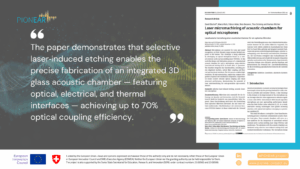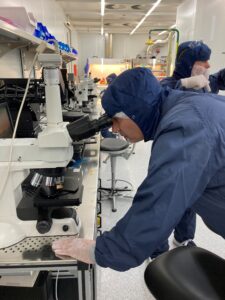PION
EAR
Developing a photonic microphone with better-than-human-ear sound quality
PIONEAR key facts
PIONEAR is an EIC-funded project within the Horizon Europe framework of the European Union, aiming to develop a novel photonic microphone technology with better-than-human-ear sound quality, improving by far the quality of current Micro-Electro-Mechanical Systems (MEM) microphones. The proposed innovation anticipates a profound impact across various sectors from consumer electronics to autonomous vehicles, promising programmable directivity and unprecedented selectivity.
- 7 Partners
- 4 European countries
- 4 years
- € 3.6M+ funding

“The PIONEAR project makes it possible for us to turn this audacious technical concept into reality, in collaboration with some of the very best people in their respective fields.”
Per Grön – Founder of Lumiary & PIONEAR project coordinator
Our technology
PIONEAR technology relies on a technique called chromometry, using light instead of electrical signals to detect sound. This novel approach allows our microphone to achieve unparalleled sensitivity and dynamic range, capable of capturing the faintest whispers and the loudest roars with exceptional clarity. As a result, our everyday electronic devices, smart TVs, smart speakers, and even smart cars could reliably be controlled by voice commands regardless of the background noise. Acoustic hearing aids would provide a more natural acoustic experience to those with impaired hearing.

Latest updates

PIONEAR’s new peer-reviewed publication in the journal tm – Technisches Messen, published by De Gruyter Brill
PIONEAR has contributed to a new peer-reviewed publication in the journal tm – Technisches Messen, published by De Gruyter Brill. The article “Laser micromachining of acoustic chambers for optical microphones”

Advancing photonic sound: PIONEAR releases its second project newsletter
The PIONEAR consortium has released the second edition of its project newsletter, offering an in-depth look at recent technical progress, partner insights, and upcoming dissemination activities. Building on the momentum

PIONEAR advances frontiers in photonics at its 5th General Meeting at UCC / Tyndall, Cork, Ireland
The PIONEAR consortium convened for its 5th General Meeting over two days (15–16 October) at the University College Cork (UCC) / Tyndall National Institute in Cork, Ireland. A total of
Project partners







